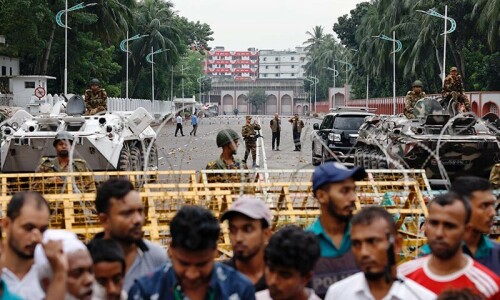WASHINGTON: An American company will build six nuclear reactors in India under an agreement announced after a White House meeting between Indian and US leaders on Tuesday.
The United States also recognised India as a “major defence partner”, on a par with America’s closest allies, for defence-related trade and technology transfers.
During their two-hour-long meeting and a working lunch, US President Barack Obama and Indian Prime Minister Narendra Modi also urged Pakistan to “bring the perpetrators of the 2008 Mumbai and 2016 Pathankot terrorist attacks to justice”.
Obama, Modi urge Pakistan to bring perpetrators of Mumbai, Pathankot attacks to justice
They asked their officials to “identify specific new areas of collaboration” against groups like Jaish-e-Mohammad, Lashkar-e-Taiba, and D Company.
The most significant understanding, however, was the deal for an American company to build nuclear reactors in India, the first since the two countries signed a landmark civil nuclear deal in 2008.
Under this plan, the Nuclear Power Corporation of India and American firm Westinghouse Electric Company would soon begin engineering and site-design work for the reactors, though the final contract would be signed in June 2017, White House officials said.
The deal marked a significant step in removing obstacles to the sale of nuclear reactors and fuel to India.
“Culminating a decade of partnership on civil nuclear issues, the leaders welcomed the start of preparatory work on-site in India for six AP 1,000 reactors to be built by Westinghouse and noted the intention of India and the US Export-Import Bank to work together towards a competitive financing package for the project,” the White House said in a statement.
A joint statement released after the Obama-Modi meeting described the US-India defence relationship as a “possible anchor of stability”, which would lead to technology sharing “at a level commensurate with that of (America’s) closest allies and partners”.
India would now receive licence-free access to a wide range of dual-use technologies. In return, India committed itself to taking several unspecified measures to advance its export control objectives, the White House said.
The allies agreed also to expand their work to enhance co-production and co-development of technologies under the Defence Technology and Trade Initiative (DTTI).
The joint statement welcomed the Indian prime minister’s offer to host a Summit on Countering Weapons of Mass Destruction and Terrorism in 2018. The United States and India would work together to combat the threat of terrorists accessing and using chemical, biological, nuclear and radiological materials, the statement said.
The leaders acknowledged the continued threat posed to “human civilisation by terrorism and condemned the recent terrorist incidents from Paris to Pathankot, from Brussels to Kabul.
“They resolved to redouble their efforts, bilaterally and with other like-minded countries, to bring to justice the perpetrators of terrorism anywhere in the world and the infrastructure that supports them.”
Noting that the United States and India were involved in “a defining counter-terrorism relationship for the 21st century”, the leaders announced further steps to deepen collaboration against the full spectrum of terrorist threats.
They committed to strengthen cooperation against threats from extremist groups, such as Al Qaeda, the militant Islamic State group, Jaish-e-Mohammad, Lashkar-e-Taiba, D Company and their affiliates, including through deepened collaboration on UN terrorist designations. In this context, they directed their officials to identify specific new areas of collaboration at the next meeting of US–India Counter-terrorism Joint Working Group.
“They also called for Pakistan to bring the perpetrators of the 2008 Mumbai and 2016 Pathankot terrorist attacks to justice.”
Published in Dawn, June 9th, 2016














































